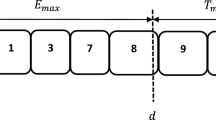Abstract
We present a family of rolling horizon procedures for the problem of minimizing total completion time on a single machine with release times. These procedures develop solutions by using information about future job arrivals at each decision point. This approach provides an excellent compromise between the excessive computation time required by exact solution methods and the poor solution quality that myopic dispatching rules may yield. Extensive computational experiments show that these procedures consistently obtain high-quality solutions in very reasonable CPU times.
Similar content being viewed by others
References
K. Bhaskaran and M. Pinedo, Dispatching, in: Handbook of Industrial Engineering, G. Salvendy, ed., Wiley, 1991, Chapter 83.
L. Bianco and S. Ricciardelli, Scheduling of a single machine to minimize total weighted completion time subject to release dates, Naval Research Logistics Quarterly 29(1982)151–167.
S. Chand, R. Traub and R. Uzsoy, Single machine scheduling with dynamic arrivals: Decomposition results and a forward algorithm, Naval Research Logistics, forthcoming.
R. Chandra, On n/1/{ie125-1} dynamic deterministic problems, Naval Research Logistics Quarterly 26 (1979)537–544.
C. Chu, A branch-and-bound algorithm to minimize total flow time with unequal release dates, Naval Research Logistics 39(1992)859–875.
C. Chu, Efficient heuristics to minimize total flow time with release dates, Operations Research Letters 12(1992)321–330.
Consilium, Inc., Short-interval scheduling module user's manual, Internal Publication, Mountain View, CA, 1988.
M.I. Dessouky and J.S. Deogun, Sequencing jobs with unequal ready times to minimize mean flow time, SIAM J. Computing 10(1981)192–202.
P.G. Gazmuri, Probabilistic analysis of a machine scheduling problem, Mathematics of Operations Research 10(1985)328–339.
A.M.A. Hariri and C.N. Potts, An algorithm for single machine sequencing with release dates to minimize total weighted completion times, Discrete Applied Mathematics 5(1983)99–109.
E.L. Lawler, J.K. Lenstra, A.H.G. Rinnooy Kan and D.B. Shmoys, Sequencing and scheduling: Algorithms and complexity, in: Handbooks in Operations Research and Management Science, Vol. 4: Logistics of Production and Inventory, S.C. Graves, A.H.G. Rinnooy Kan and P. Zipkin, eds., North-Holland, 1993.
C.Y. Lee, L.A. Martin-Vega and R. Uzsoy, Implementation of Decision Support System for scheduling semiconductor test operations, Journal of Electronics Manufacturing 3(1993).
W. Mao and R. Kincaid, A look-ahead heuristic for scheduling jobs with release dates on a single machine, Computers and Operations Research 21(1994)1041–1050.
I.M. Ovacik and R. Uzsoy, Rolling horizon procedures for a single machine dynamic scheduling problem with sequence-dependent setup times, International Journal of Production Research 32 (1994)1243–1263.
W.E. Smith, Various optimizers for single-stage production, Naval Research Logistics Quarterly 3 (1956)59–66.
Rights and permissions
About this article
Cite this article
Chand, S., Traub, R. & Uzsoy, R. Rolling horizon procedures for the single machine deterministic total completion time scheduling problem with release dates. Annals of Operations Research 70, 115–125 (1997). https://doi.org/10.1023/A:1018961818782
Issue Date:
DOI: https://doi.org/10.1023/A:1018961818782



